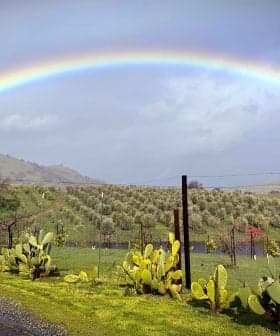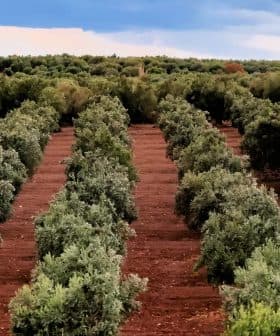Texas Olive Oil Producers Eye Formation of Advisory Board
The advisory board would provide olive growers and oil producers with more access to state and federal funds as well as increase their lobbying clout in Austin.
 Texas Farm Bureau
Texas Farm BureauCathy Bernell, a board member of the Texas Association of Olive Oil, is working to establish quality standards for olive oil in Texas through the creation of an advisory board. The board aims to secure funding for the industry, enforce quality standards, and provide educational programs at universities to boost the growth of the olive oil sector in the state. Bernell is optimistic about the approval of the petition to create the advisory board, believing it will pave the way for significant progress in the Texas olive oil industry.
“We’re not trying to re-invent the wheel,” Cathy Bernell said with a laugh. “We’re looking to get on the wagon.”
Bernell is a board member of the Texas Association of Olive Oil (TXAOO) as well as an olive farmer and oil producer in eastern Texas, who is trying to establish and enforce olive oil quality standards in the state.
We’re basically looking to become a domestic supplier of olives and extra virgin olive oil at a substantial level.
Last week, she went up to the Hill in Austin and sat in on a hearing at the Agriculture and Livestock Committee of the state’s House of Representatives. Members of the TXAOO made their case to become an advisory board.
“[The hearing] went beyond expectations. It was terrific,” Bernell told Olive Oil Times. “We were extremely well received by the legislative members. And we had members of our industry show up.”
She thoroughly believes that the Texas olive oil sector could only benefit from forming an advisory board.
Those benefits could come in the form of grant funding from the Texas Department of Agriculture (TDA) and U.S. Department of Agriculture (USDA); the implementation and enforcement of quality standards for virgin and extra virgin olive oil; and funding for olive-specific educational programs at universities, akin to the University of California, Davis Olive Center
“The purpose of that is basically to have [the legislature] recognize our industry in such a manner that when federal funds, state funds, legislation, any of those come along, that we’re a consideration,” Bernell said. “They’re not just going to think about pecans and peaches now, they’re going to think about olives as well.”
In order to officially become an advisory board, the TXAOO must send a petition to the TDA. Then it will be up to the commissioner, Sid Miller, to approve the petition or not.
Last week’s meeting at the Texas House of Representatives was the first step toward making and submitting the petition. Bernell said that the Dan Hunter, the assistant commissioner, had wholeheartedly given his support to the TXAOO, leaving the impression that a petition would be approved once it was submitted.
“It is my understanding from the commissioner that it’s not a problem,” Bernell said. “I don’t want to call it a slam dunk because nothing ever is, but I think we’re on a very positive path with that.”
Mark Loeffler, a spokesman for the TDA, said that the department had not yet received an official petition from the TXAOO and did not comment on the likelihood of its immediate approval. However, he told Olive Oil Times that the TDA is fully supportive of the sector and believes it has great potential.
“The Texas olive oil industry has unlimited potential for growth as it offers opportunities at the retail and restaurant level, and agritourism,” he said. “Commissioner Miller has worked hard to ensure TDA has the lead role in promoting Texas-grown products, at home and around the world.”
Among the ways in which the TDA already supports the olive sector is through awarding specialty crop grants to the TXAOO and providing funding through the Young Farmer Grant Program.
Specialty crop grants may be applied for by Texas fruit and vegetable farmers on a biannual basis and provide funding “to enhance the competitiveness of specialty crops.” According to the TDA, the funds may be used for marketing and industry development, both of which Bernell believes are crucial for growing the sector.
The Young Farmer Grant Program matches dollar-for-dollar any investment in creating or expanding a Texas agricultural business up to $20,000. All applicants must be under the age of 46 in order to be eligible for the funding.
However, Bernell believes the formation of an advisory board would be a more effective way to provide funding for the three main targets of the TXAOO: research, marketing and standardization.
Christopher Kasmiroski is the owner of Texas Angel Oil, which operates in eastern Texas. He told Olive Oil Times that while he was unaware of the push for regulation by the TXAOO, he believes that the establishment of standards will spur growth in the sector.
“I will say a long-held belief I still hold is that I hope any regulation encourages new entrepreneurs to enter into the olive oil industry,” he said.
Currently, there are no standards for Texas olive oil producers and the TDA has no hand in regulating the industry.
“We kind of have a gentleman’s agreement that we will use California’s standards,” Bernell said. Once the advisory board is set up and standards have been established, she hopes that the TDA can then begin to collect and test samples, acting as an enforcer.
She also hopes the more available funds will allow for research into determining which olive varieties grow best in different parts of Texas as well as how to mitigate the effects of early spring thaws and freezes. The latter happened in January 2017, when an 89-degree day quickly turned into a 25-degree one, damaging some olive crops in the state.
In Bernell’s view, education comes hand-in-hand with research. She looks to California, where the UC Davis Olive Center has created a generation of olive-specific academics in the state that has become synonymous with American-made olive oil. Bernell wants Texas to shift this paradigm.
“We need accredited universities to educate our young people in olives just the same way they do with grapes,” she said. “I know Texas A&M, Sam Houston State University and Texas Tech are all on board with the olive industry and they would all very much welcome something along the line of an olive center.”
The problem, again, comes back to funding. Bernell once again circles back to the importance of the advisory board, which is the common denominator in getting this vision for Texas olive oil off of the ground.
Once the advisory board is established the next step will be to begin the legislative process to create the standards and enforcement mechanisms. The Texas House of Representatives is out of session until January 2019.
Until then, Bernell and others at the TXAOO are speaking to members of the association, which is composed of the majority of the state’s olive growers, in order to determine what their wants and needs are. She has also enlisted a former TDA official-turned-lobbyist to help navigate the legislative process.
“Then the next step is to get the legislation written in conjunction with our members to make sure that our members are on board and agree with the path that we’re on,” she said. “And again, we’re not reinventing the wheel, we’re definitely pulling from everybody’s standards and legislation, from California to Australia, and learning from them.”
Texas may be a new arrival to the sector, but Bernell does not count out a meteoric rise from Lone Star State producers. After all, Texas generates the second-largest amount of revenue from selling agricultural products in the U.S. (California is the only state that generates more.)
“The infrastructure in Texas for such a young industry is quite good. We have a number of mills, we have a number of dependable partners, we have the mobile mill,” Bernell said. “We’re basically looking to become a domestic supplier of olives and extra virgin olive oil at a substantial level.”









